Annotated Bibliography: Strategy for Workforce Development
VerifiedAdded on 2023/06/13
|9
|2515
|307
Annotated Bibliography
AI Summary
This annotated bibliography examines critical aspects of hospitality management through a selection of research articles. The bibliography covers themes such as employee mobility, the impact of employee retention on economic stability, strategies for workforce development with a focus on job location, the role of corporate social responsibility (CSR) in retaining employees, and the influence of transformational leadership on employee creativity. Each annotation summarizes the article's main points, discusses its relevance to the hospitality sector, and highlights its implications for managers and organizations. The articles collectively emphasize the importance of understanding employee needs, fostering positive work environments, and implementing effective management practices to address challenges like high turnover and the need for a skilled and engaged workforce. Desklib offers similar solved assignments and study tools for students.
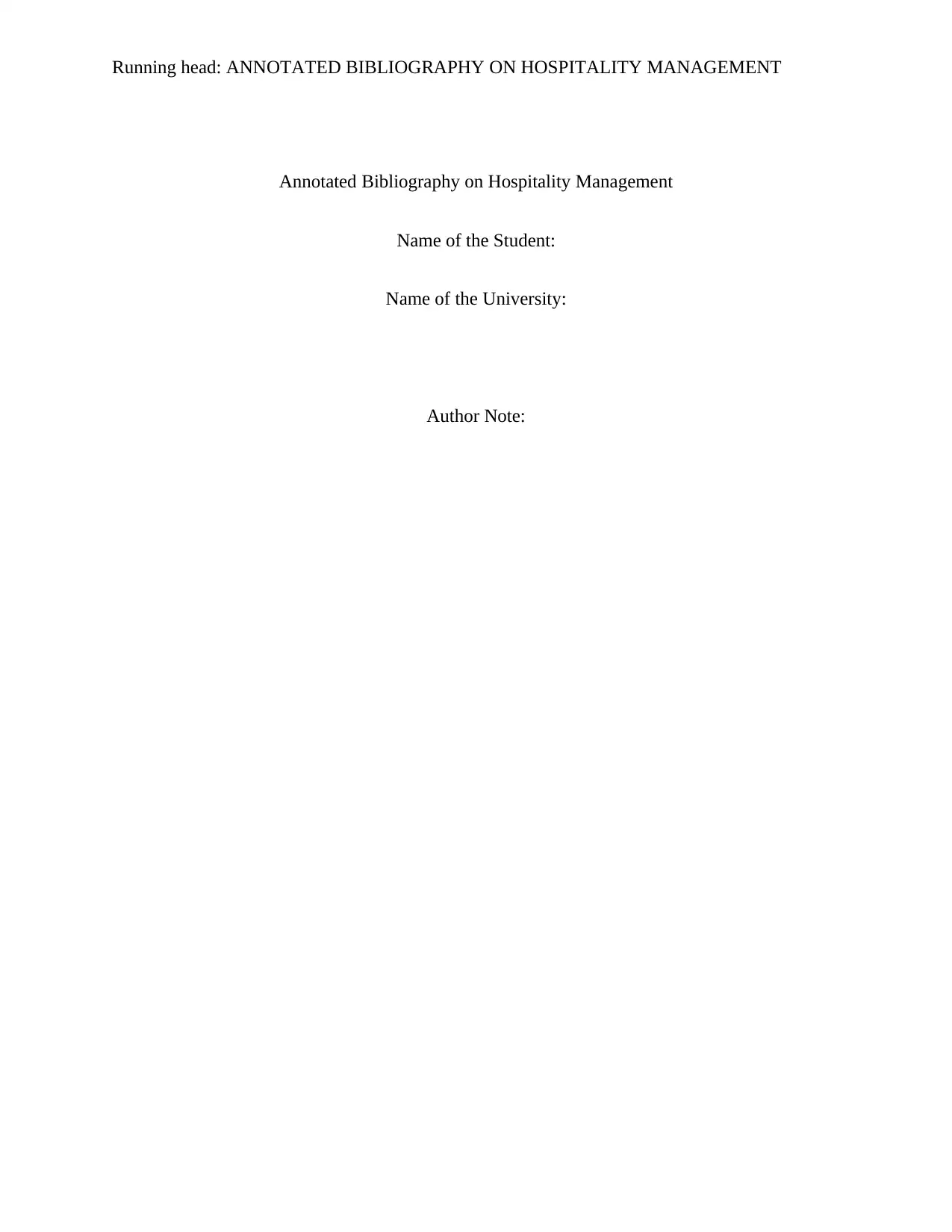
Running head: ANNOTATED BIBLIOGRAPHY ON HOSPITALITY MANAGEMENT
Annotated Bibliography on Hospitality Management
Name of the Student:
Name of the University:
Author Note:
Annotated Bibliography on Hospitality Management
Name of the Student:
Name of the University:
Author Note:
Paraphrase This Document
Need a fresh take? Get an instant paraphrase of this document with our AI Paraphraser
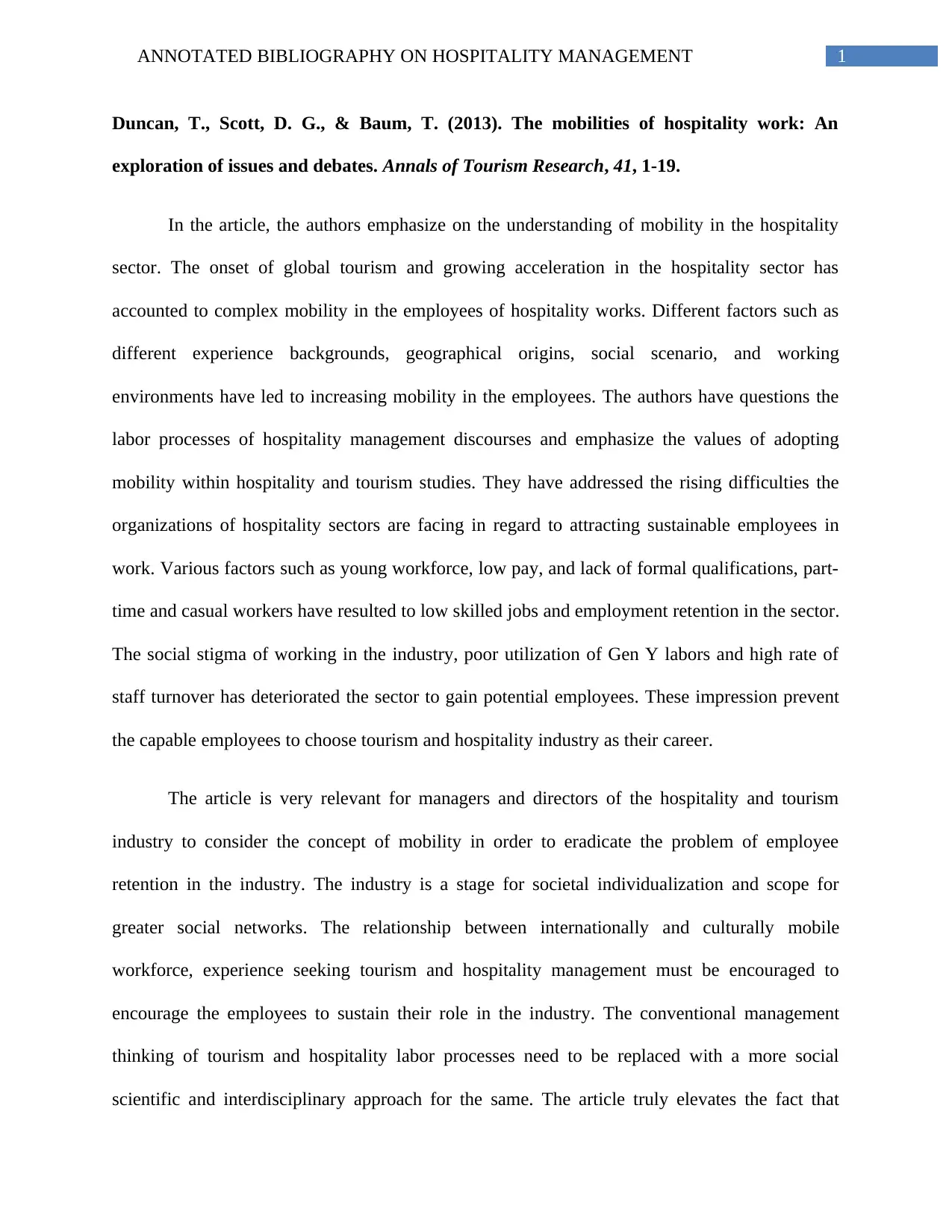
1ANNOTATED BIBLIOGRAPHY ON HOSPITALITY MANAGEMENT
Duncan, T., Scott, D. G., & Baum, T. (2013). The mobilities of hospitality work: An
exploration of issues and debates. Annals of Tourism Research, 41, 1-19.
In the article, the authors emphasize on the understanding of mobility in the hospitality
sector. The onset of global tourism and growing acceleration in the hospitality sector has
accounted to complex mobility in the employees of hospitality works. Different factors such as
different experience backgrounds, geographical origins, social scenario, and working
environments have led to increasing mobility in the employees. The authors have questions the
labor processes of hospitality management discourses and emphasize the values of adopting
mobility within hospitality and tourism studies. They have addressed the rising difficulties the
organizations of hospitality sectors are facing in regard to attracting sustainable employees in
work. Various factors such as young workforce, low pay, and lack of formal qualifications, part-
time and casual workers have resulted to low skilled jobs and employment retention in the sector.
The social stigma of working in the industry, poor utilization of Gen Y labors and high rate of
staff turnover has deteriorated the sector to gain potential employees. These impression prevent
the capable employees to choose tourism and hospitality industry as their career.
The article is very relevant for managers and directors of the hospitality and tourism
industry to consider the concept of mobility in order to eradicate the problem of employee
retention in the industry. The industry is a stage for societal individualization and scope for
greater social networks. The relationship between internationally and culturally mobile
workforce, experience seeking tourism and hospitality management must be encouraged to
encourage the employees to sustain their role in the industry. The conventional management
thinking of tourism and hospitality labor processes need to be replaced with a more social
scientific and interdisciplinary approach for the same. The article truly elevates the fact that
Duncan, T., Scott, D. G., & Baum, T. (2013). The mobilities of hospitality work: An
exploration of issues and debates. Annals of Tourism Research, 41, 1-19.
In the article, the authors emphasize on the understanding of mobility in the hospitality
sector. The onset of global tourism and growing acceleration in the hospitality sector has
accounted to complex mobility in the employees of hospitality works. Different factors such as
different experience backgrounds, geographical origins, social scenario, and working
environments have led to increasing mobility in the employees. The authors have questions the
labor processes of hospitality management discourses and emphasize the values of adopting
mobility within hospitality and tourism studies. They have addressed the rising difficulties the
organizations of hospitality sectors are facing in regard to attracting sustainable employees in
work. Various factors such as young workforce, low pay, and lack of formal qualifications, part-
time and casual workers have resulted to low skilled jobs and employment retention in the sector.
The social stigma of working in the industry, poor utilization of Gen Y labors and high rate of
staff turnover has deteriorated the sector to gain potential employees. These impression prevent
the capable employees to choose tourism and hospitality industry as their career.
The article is very relevant for managers and directors of the hospitality and tourism
industry to consider the concept of mobility in order to eradicate the problem of employee
retention in the industry. The industry is a stage for societal individualization and scope for
greater social networks. The relationship between internationally and culturally mobile
workforce, experience seeking tourism and hospitality management must be encouraged to
encourage the employees to sustain their role in the industry. The conventional management
thinking of tourism and hospitality labor processes need to be replaced with a more social
scientific and interdisciplinary approach for the same. The article truly elevates the fact that
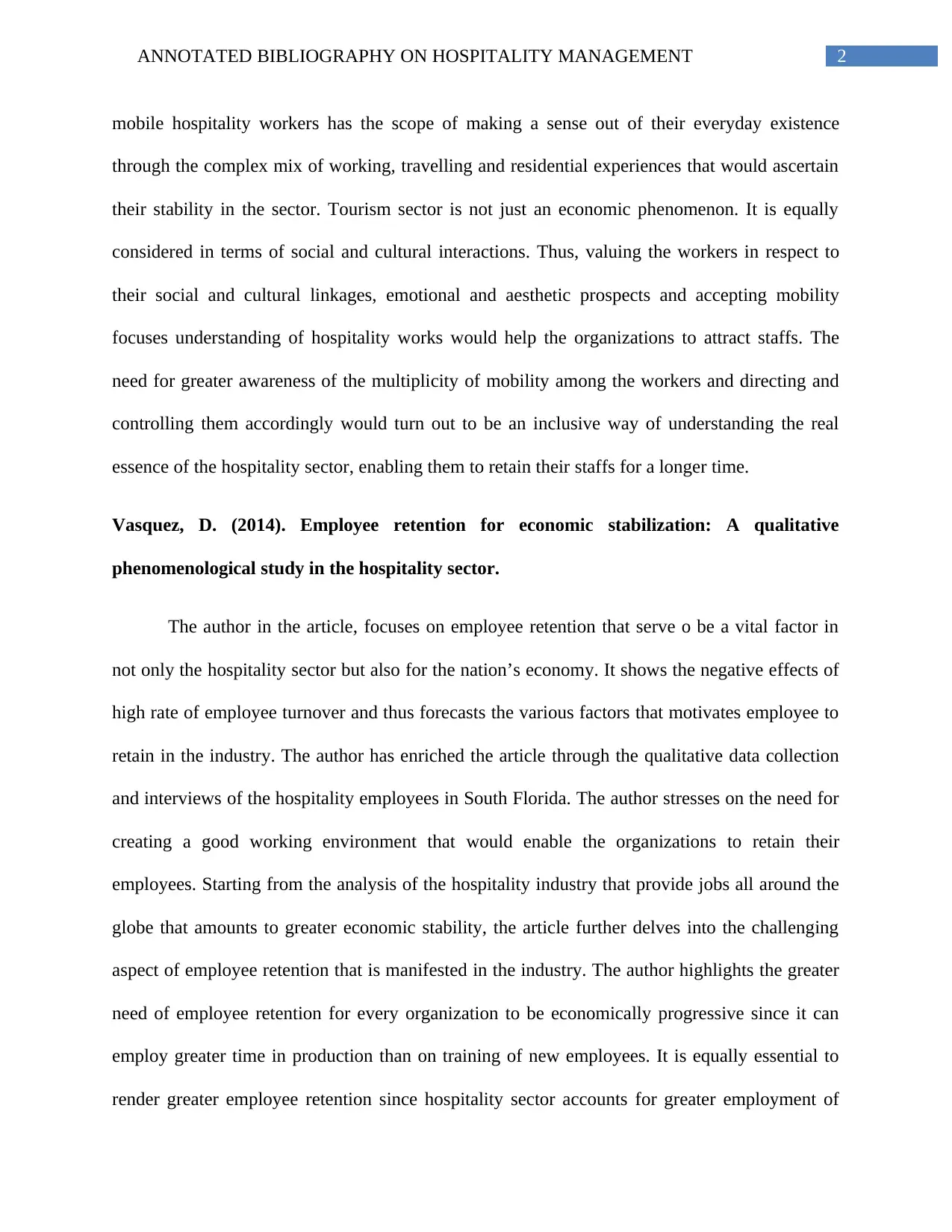
2ANNOTATED BIBLIOGRAPHY ON HOSPITALITY MANAGEMENT
mobile hospitality workers has the scope of making a sense out of their everyday existence
through the complex mix of working, travelling and residential experiences that would ascertain
their stability in the sector. Tourism sector is not just an economic phenomenon. It is equally
considered in terms of social and cultural interactions. Thus, valuing the workers in respect to
their social and cultural linkages, emotional and aesthetic prospects and accepting mobility
focuses understanding of hospitality works would help the organizations to attract staffs. The
need for greater awareness of the multiplicity of mobility among the workers and directing and
controlling them accordingly would turn out to be an inclusive way of understanding the real
essence of the hospitality sector, enabling them to retain their staffs for a longer time.
Vasquez, D. (2014). Employee retention for economic stabilization: A qualitative
phenomenological study in the hospitality sector.
The author in the article, focuses on employee retention that serve o be a vital factor in
not only the hospitality sector but also for the nation’s economy. It shows the negative effects of
high rate of employee turnover and thus forecasts the various factors that motivates employee to
retain in the industry. The author has enriched the article through the qualitative data collection
and interviews of the hospitality employees in South Florida. The author stresses on the need for
creating a good working environment that would enable the organizations to retain their
employees. Starting from the analysis of the hospitality industry that provide jobs all around the
globe that amounts to greater economic stability, the article further delves into the challenging
aspect of employee retention that is manifested in the industry. The author highlights the greater
need of employee retention for every organization to be economically progressive since it can
employ greater time in production than on training of new employees. It is equally essential to
render greater employee retention since hospitality sector accounts for greater employment of
mobile hospitality workers has the scope of making a sense out of their everyday existence
through the complex mix of working, travelling and residential experiences that would ascertain
their stability in the sector. Tourism sector is not just an economic phenomenon. It is equally
considered in terms of social and cultural interactions. Thus, valuing the workers in respect to
their social and cultural linkages, emotional and aesthetic prospects and accepting mobility
focuses understanding of hospitality works would help the organizations to attract staffs. The
need for greater awareness of the multiplicity of mobility among the workers and directing and
controlling them accordingly would turn out to be an inclusive way of understanding the real
essence of the hospitality sector, enabling them to retain their staffs for a longer time.
Vasquez, D. (2014). Employee retention for economic stabilization: A qualitative
phenomenological study in the hospitality sector.
The author in the article, focuses on employee retention that serve o be a vital factor in
not only the hospitality sector but also for the nation’s economy. It shows the negative effects of
high rate of employee turnover and thus forecasts the various factors that motivates employee to
retain in the industry. The author has enriched the article through the qualitative data collection
and interviews of the hospitality employees in South Florida. The author stresses on the need for
creating a good working environment that would enable the organizations to retain their
employees. Starting from the analysis of the hospitality industry that provide jobs all around the
globe that amounts to greater economic stability, the article further delves into the challenging
aspect of employee retention that is manifested in the industry. The author highlights the greater
need of employee retention for every organization to be economically progressive since it can
employ greater time in production than on training of new employees. It is equally essential to
render greater employee retention since hospitality sector accounts for greater employment of
⊘ This is a preview!⊘
Do you want full access?
Subscribe today to unlock all pages.

Trusted by 1+ million students worldwide
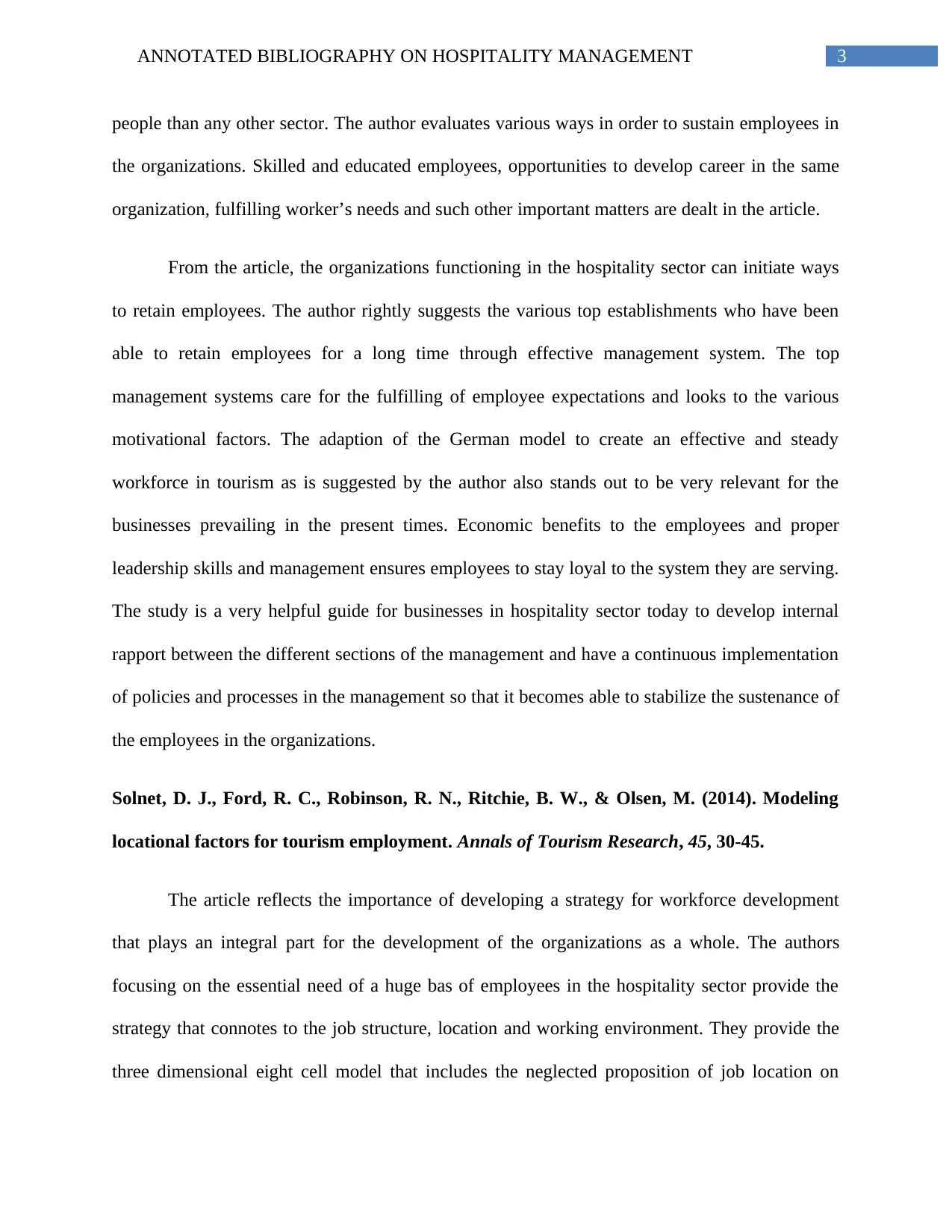
3ANNOTATED BIBLIOGRAPHY ON HOSPITALITY MANAGEMENT
people than any other sector. The author evaluates various ways in order to sustain employees in
the organizations. Skilled and educated employees, opportunities to develop career in the same
organization, fulfilling worker’s needs and such other important matters are dealt in the article.
From the article, the organizations functioning in the hospitality sector can initiate ways
to retain employees. The author rightly suggests the various top establishments who have been
able to retain employees for a long time through effective management system. The top
management systems care for the fulfilling of employee expectations and looks to the various
motivational factors. The adaption of the German model to create an effective and steady
workforce in tourism as is suggested by the author also stands out to be very relevant for the
businesses prevailing in the present times. Economic benefits to the employees and proper
leadership skills and management ensures employees to stay loyal to the system they are serving.
The study is a very helpful guide for businesses in hospitality sector today to develop internal
rapport between the different sections of the management and have a continuous implementation
of policies and processes in the management so that it becomes able to stabilize the sustenance of
the employees in the organizations.
Solnet, D. J., Ford, R. C., Robinson, R. N., Ritchie, B. W., & Olsen, M. (2014). Modeling
locational factors for tourism employment. Annals of Tourism Research, 45, 30-45.
The article reflects the importance of developing a strategy for workforce development
that plays an integral part for the development of the organizations as a whole. The authors
focusing on the essential need of a huge bas of employees in the hospitality sector provide the
strategy that connotes to the job structure, location and working environment. They provide the
three dimensional eight cell model that includes the neglected proposition of job location on
people than any other sector. The author evaluates various ways in order to sustain employees in
the organizations. Skilled and educated employees, opportunities to develop career in the same
organization, fulfilling worker’s needs and such other important matters are dealt in the article.
From the article, the organizations functioning in the hospitality sector can initiate ways
to retain employees. The author rightly suggests the various top establishments who have been
able to retain employees for a long time through effective management system. The top
management systems care for the fulfilling of employee expectations and looks to the various
motivational factors. The adaption of the German model to create an effective and steady
workforce in tourism as is suggested by the author also stands out to be very relevant for the
businesses prevailing in the present times. Economic benefits to the employees and proper
leadership skills and management ensures employees to stay loyal to the system they are serving.
The study is a very helpful guide for businesses in hospitality sector today to develop internal
rapport between the different sections of the management and have a continuous implementation
of policies and processes in the management so that it becomes able to stabilize the sustenance of
the employees in the organizations.
Solnet, D. J., Ford, R. C., Robinson, R. N., Ritchie, B. W., & Olsen, M. (2014). Modeling
locational factors for tourism employment. Annals of Tourism Research, 45, 30-45.
The article reflects the importance of developing a strategy for workforce development
that plays an integral part for the development of the organizations as a whole. The authors
focusing on the essential need of a huge bas of employees in the hospitality sector provide the
strategy that connotes to the job structure, location and working environment. They provide the
three dimensional eight cell model that includes the neglected proposition of job location on
Paraphrase This Document
Need a fresh take? Get an instant paraphrase of this document with our AI Paraphraser
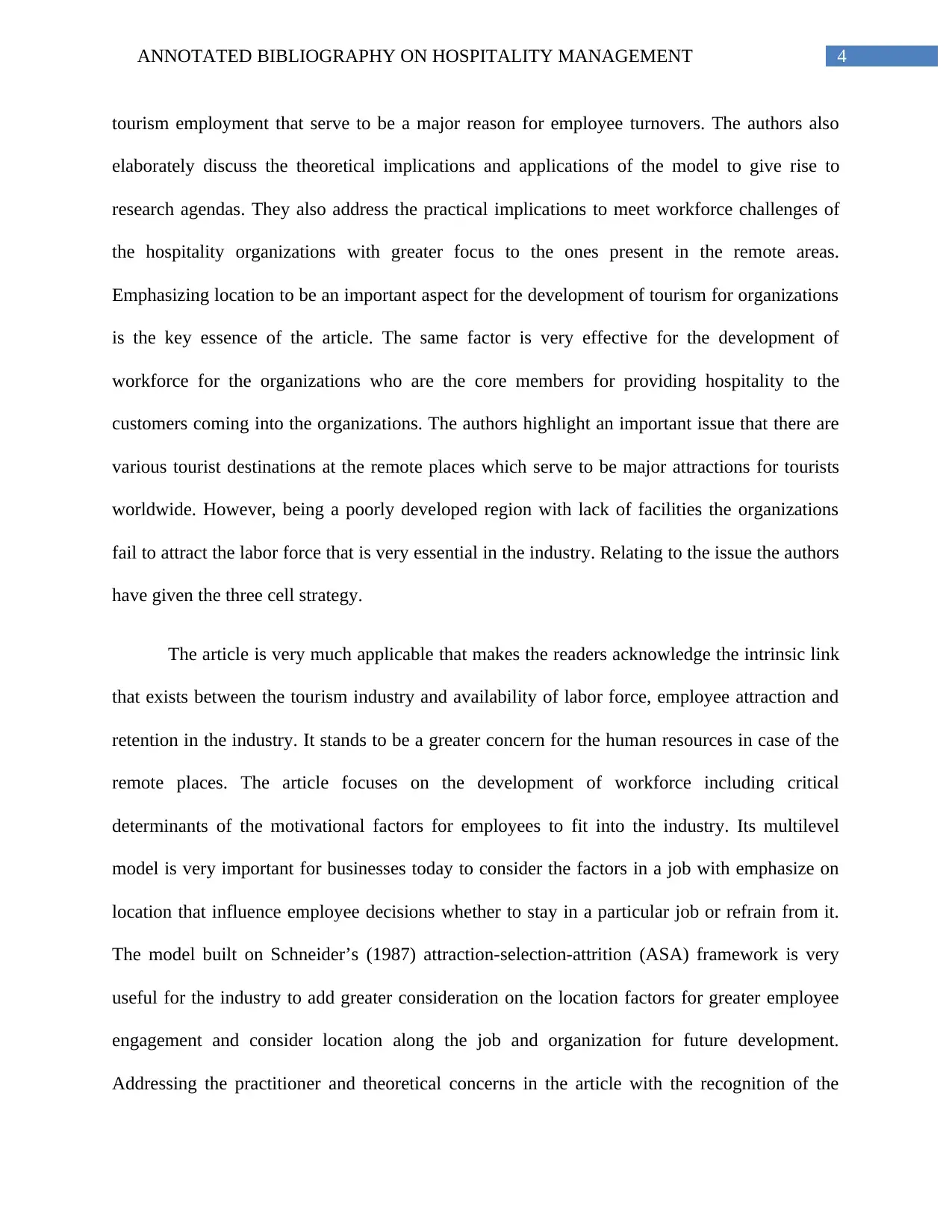
4ANNOTATED BIBLIOGRAPHY ON HOSPITALITY MANAGEMENT
tourism employment that serve to be a major reason for employee turnovers. The authors also
elaborately discuss the theoretical implications and applications of the model to give rise to
research agendas. They also address the practical implications to meet workforce challenges of
the hospitality organizations with greater focus to the ones present in the remote areas.
Emphasizing location to be an important aspect for the development of tourism for organizations
is the key essence of the article. The same factor is very effective for the development of
workforce for the organizations who are the core members for providing hospitality to the
customers coming into the organizations. The authors highlight an important issue that there are
various tourist destinations at the remote places which serve to be major attractions for tourists
worldwide. However, being a poorly developed region with lack of facilities the organizations
fail to attract the labor force that is very essential in the industry. Relating to the issue the authors
have given the three cell strategy.
The article is very much applicable that makes the readers acknowledge the intrinsic link
that exists between the tourism industry and availability of labor force, employee attraction and
retention in the industry. It stands to be a greater concern for the human resources in case of the
remote places. The article focuses on the development of workforce including critical
determinants of the motivational factors for employees to fit into the industry. Its multilevel
model is very important for businesses today to consider the factors in a job with emphasize on
location that influence employee decisions whether to stay in a particular job or refrain from it.
The model built on Schneider’s (1987) attraction-selection-attrition (ASA) framework is very
useful for the industry to add greater consideration on the location factors for greater employee
engagement and consider location along the job and organization for future development.
Addressing the practitioner and theoretical concerns in the article with the recognition of the
tourism employment that serve to be a major reason for employee turnovers. The authors also
elaborately discuss the theoretical implications and applications of the model to give rise to
research agendas. They also address the practical implications to meet workforce challenges of
the hospitality organizations with greater focus to the ones present in the remote areas.
Emphasizing location to be an important aspect for the development of tourism for organizations
is the key essence of the article. The same factor is very effective for the development of
workforce for the organizations who are the core members for providing hospitality to the
customers coming into the organizations. The authors highlight an important issue that there are
various tourist destinations at the remote places which serve to be major attractions for tourists
worldwide. However, being a poorly developed region with lack of facilities the organizations
fail to attract the labor force that is very essential in the industry. Relating to the issue the authors
have given the three cell strategy.
The article is very much applicable that makes the readers acknowledge the intrinsic link
that exists between the tourism industry and availability of labor force, employee attraction and
retention in the industry. It stands to be a greater concern for the human resources in case of the
remote places. The article focuses on the development of workforce including critical
determinants of the motivational factors for employees to fit into the industry. Its multilevel
model is very important for businesses today to consider the factors in a job with emphasize on
location that influence employee decisions whether to stay in a particular job or refrain from it.
The model built on Schneider’s (1987) attraction-selection-attrition (ASA) framework is very
useful for the industry to add greater consideration on the location factors for greater employee
engagement and consider location along the job and organization for future development.
Addressing the practitioner and theoretical concerns in the article with the recognition of the
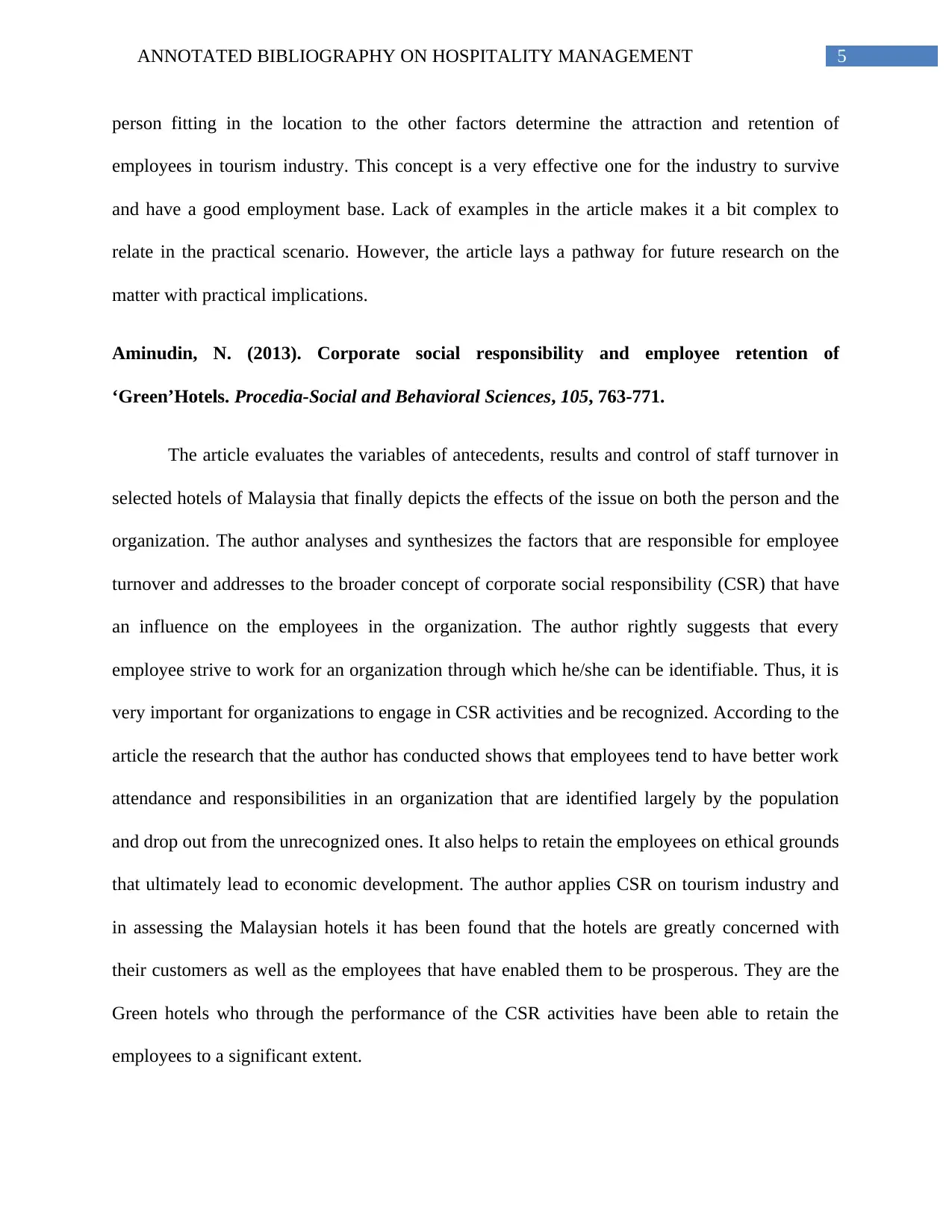
5ANNOTATED BIBLIOGRAPHY ON HOSPITALITY MANAGEMENT
person fitting in the location to the other factors determine the attraction and retention of
employees in tourism industry. This concept is a very effective one for the industry to survive
and have a good employment base. Lack of examples in the article makes it a bit complex to
relate in the practical scenario. However, the article lays a pathway for future research on the
matter with practical implications.
Aminudin, N. (2013). Corporate social responsibility and employee retention of
‘Green’Hotels. Procedia-Social and Behavioral Sciences, 105, 763-771.
The article evaluates the variables of antecedents, results and control of staff turnover in
selected hotels of Malaysia that finally depicts the effects of the issue on both the person and the
organization. The author analyses and synthesizes the factors that are responsible for employee
turnover and addresses to the broader concept of corporate social responsibility (CSR) that have
an influence on the employees in the organization. The author rightly suggests that every
employee strive to work for an organization through which he/she can be identifiable. Thus, it is
very important for organizations to engage in CSR activities and be recognized. According to the
article the research that the author has conducted shows that employees tend to have better work
attendance and responsibilities in an organization that are identified largely by the population
and drop out from the unrecognized ones. It also helps to retain the employees on ethical grounds
that ultimately lead to economic development. The author applies CSR on tourism industry and
in assessing the Malaysian hotels it has been found that the hotels are greatly concerned with
their customers as well as the employees that have enabled them to be prosperous. They are the
Green hotels who through the performance of the CSR activities have been able to retain the
employees to a significant extent.
person fitting in the location to the other factors determine the attraction and retention of
employees in tourism industry. This concept is a very effective one for the industry to survive
and have a good employment base. Lack of examples in the article makes it a bit complex to
relate in the practical scenario. However, the article lays a pathway for future research on the
matter with practical implications.
Aminudin, N. (2013). Corporate social responsibility and employee retention of
‘Green’Hotels. Procedia-Social and Behavioral Sciences, 105, 763-771.
The article evaluates the variables of antecedents, results and control of staff turnover in
selected hotels of Malaysia that finally depicts the effects of the issue on both the person and the
organization. The author analyses and synthesizes the factors that are responsible for employee
turnover and addresses to the broader concept of corporate social responsibility (CSR) that have
an influence on the employees in the organization. The author rightly suggests that every
employee strive to work for an organization through which he/she can be identifiable. Thus, it is
very important for organizations to engage in CSR activities and be recognized. According to the
article the research that the author has conducted shows that employees tend to have better work
attendance and responsibilities in an organization that are identified largely by the population
and drop out from the unrecognized ones. It also helps to retain the employees on ethical grounds
that ultimately lead to economic development. The author applies CSR on tourism industry and
in assessing the Malaysian hotels it has been found that the hotels are greatly concerned with
their customers as well as the employees that have enabled them to be prosperous. They are the
Green hotels who through the performance of the CSR activities have been able to retain the
employees to a significant extent.
⊘ This is a preview!⊘
Do you want full access?
Subscribe today to unlock all pages.

Trusted by 1+ million students worldwide
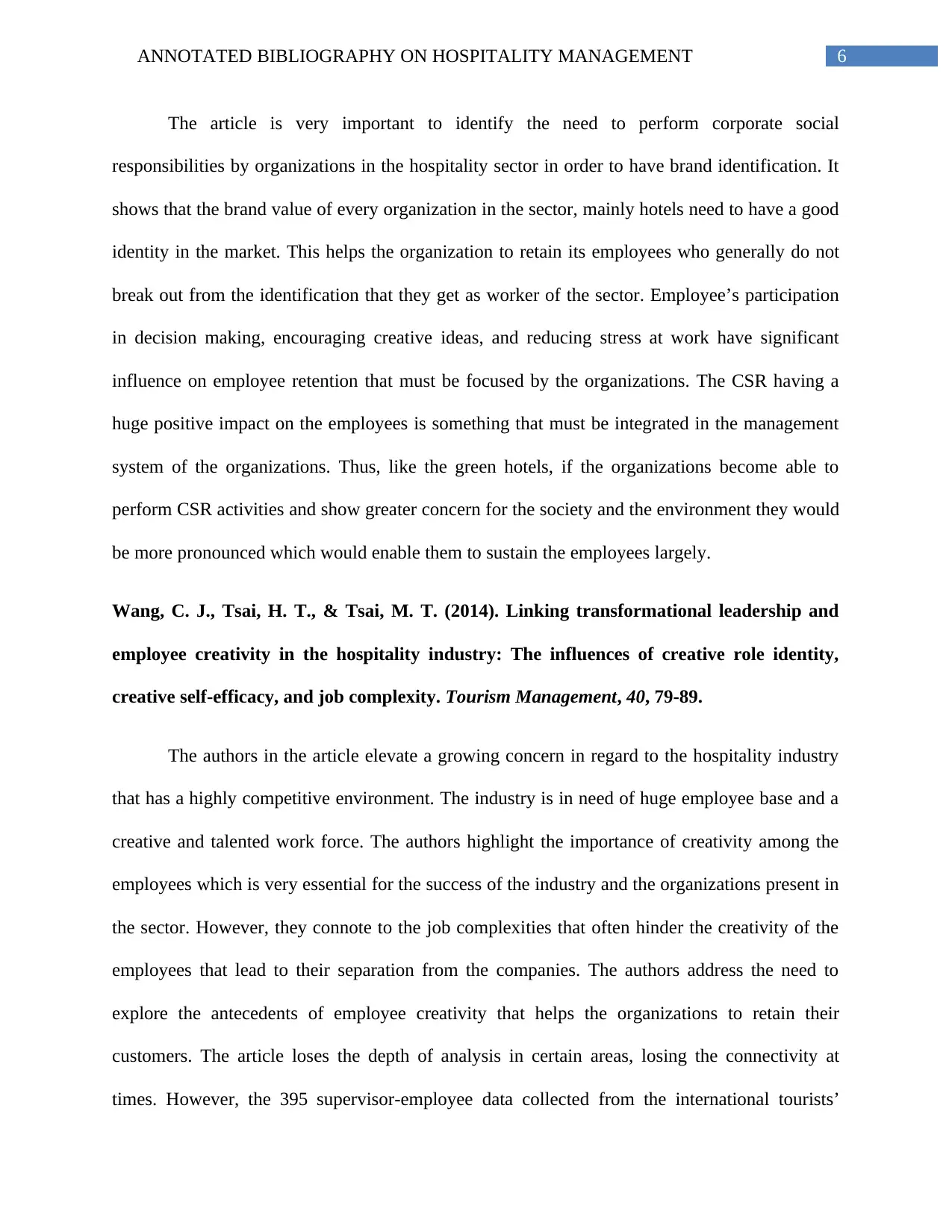
6ANNOTATED BIBLIOGRAPHY ON HOSPITALITY MANAGEMENT
The article is very important to identify the need to perform corporate social
responsibilities by organizations in the hospitality sector in order to have brand identification. It
shows that the brand value of every organization in the sector, mainly hotels need to have a good
identity in the market. This helps the organization to retain its employees who generally do not
break out from the identification that they get as worker of the sector. Employee’s participation
in decision making, encouraging creative ideas, and reducing stress at work have significant
influence on employee retention that must be focused by the organizations. The CSR having a
huge positive impact on the employees is something that must be integrated in the management
system of the organizations. Thus, like the green hotels, if the organizations become able to
perform CSR activities and show greater concern for the society and the environment they would
be more pronounced which would enable them to sustain the employees largely.
Wang, C. J., Tsai, H. T., & Tsai, M. T. (2014). Linking transformational leadership and
employee creativity in the hospitality industry: The influences of creative role identity,
creative self-efficacy, and job complexity. Tourism Management, 40, 79-89.
The authors in the article elevate a growing concern in regard to the hospitality industry
that has a highly competitive environment. The industry is in need of huge employee base and a
creative and talented work force. The authors highlight the importance of creativity among the
employees which is very essential for the success of the industry and the organizations present in
the sector. However, they connote to the job complexities that often hinder the creativity of the
employees that lead to their separation from the companies. The authors address the need to
explore the antecedents of employee creativity that helps the organizations to retain their
customers. The article loses the depth of analysis in certain areas, losing the connectivity at
times. However, the 395 supervisor-employee data collected from the international tourists’
The article is very important to identify the need to perform corporate social
responsibilities by organizations in the hospitality sector in order to have brand identification. It
shows that the brand value of every organization in the sector, mainly hotels need to have a good
identity in the market. This helps the organization to retain its employees who generally do not
break out from the identification that they get as worker of the sector. Employee’s participation
in decision making, encouraging creative ideas, and reducing stress at work have significant
influence on employee retention that must be focused by the organizations. The CSR having a
huge positive impact on the employees is something that must be integrated in the management
system of the organizations. Thus, like the green hotels, if the organizations become able to
perform CSR activities and show greater concern for the society and the environment they would
be more pronounced which would enable them to sustain the employees largely.
Wang, C. J., Tsai, H. T., & Tsai, M. T. (2014). Linking transformational leadership and
employee creativity in the hospitality industry: The influences of creative role identity,
creative self-efficacy, and job complexity. Tourism Management, 40, 79-89.
The authors in the article elevate a growing concern in regard to the hospitality industry
that has a highly competitive environment. The industry is in need of huge employee base and a
creative and talented work force. The authors highlight the importance of creativity among the
employees which is very essential for the success of the industry and the organizations present in
the sector. However, they connote to the job complexities that often hinder the creativity of the
employees that lead to their separation from the companies. The authors address the need to
explore the antecedents of employee creativity that helps the organizations to retain their
customers. The article loses the depth of analysis in certain areas, losing the connectivity at
times. However, the 395 supervisor-employee data collected from the international tourists’
Paraphrase This Document
Need a fresh take? Get an instant paraphrase of this document with our AI Paraphraser
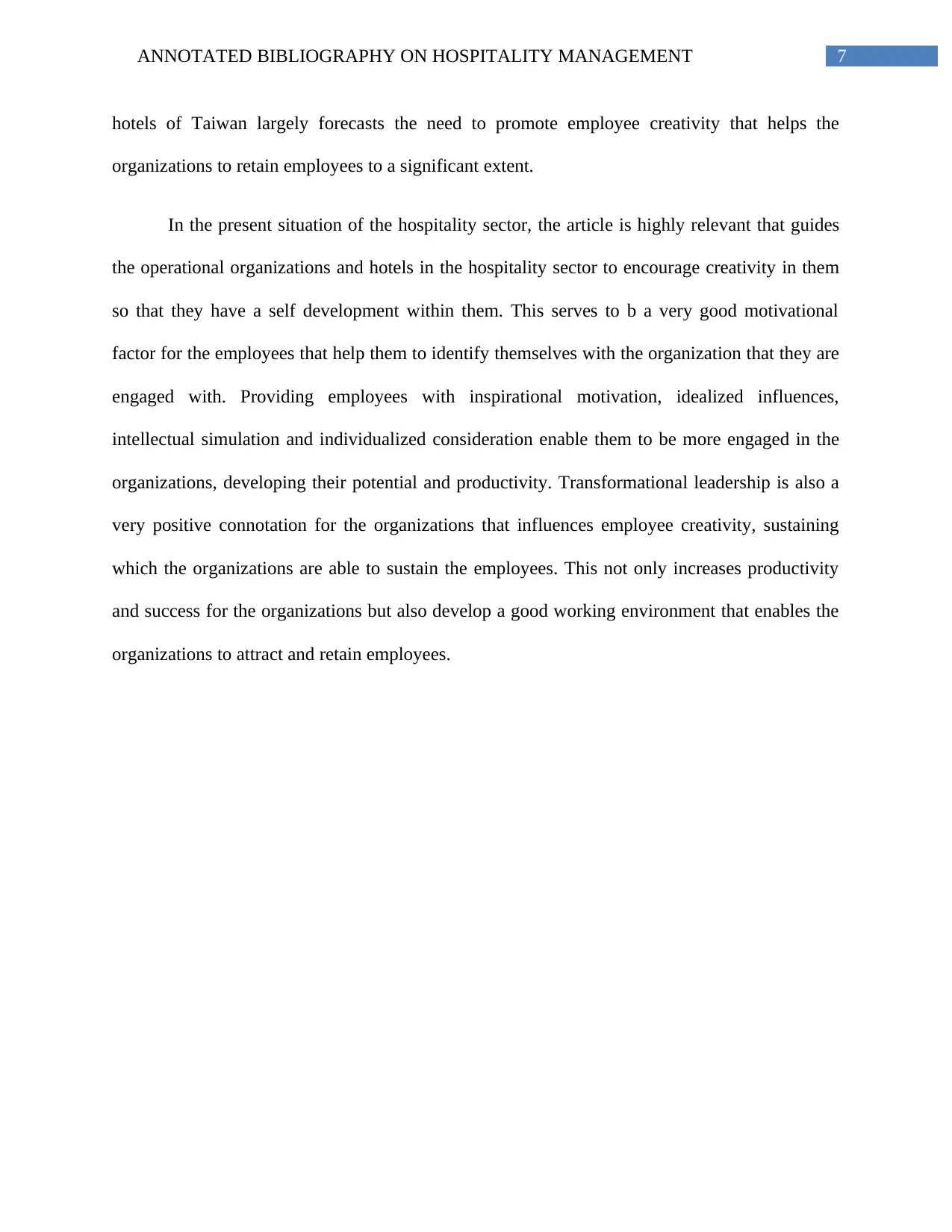
7ANNOTATED BIBLIOGRAPHY ON HOSPITALITY MANAGEMENT
hotels of Taiwan largely forecasts the need to promote employee creativity that helps the
organizations to retain employees to a significant extent.
In the present situation of the hospitality sector, the article is highly relevant that guides
the operational organizations and hotels in the hospitality sector to encourage creativity in them
so that they have a self development within them. This serves to b a very good motivational
factor for the employees that help them to identify themselves with the organization that they are
engaged with. Providing employees with inspirational motivation, idealized influences,
intellectual simulation and individualized consideration enable them to be more engaged in the
organizations, developing their potential and productivity. Transformational leadership is also a
very positive connotation for the organizations that influences employee creativity, sustaining
which the organizations are able to sustain the employees. This not only increases productivity
and success for the organizations but also develop a good working environment that enables the
organizations to attract and retain employees.
hotels of Taiwan largely forecasts the need to promote employee creativity that helps the
organizations to retain employees to a significant extent.
In the present situation of the hospitality sector, the article is highly relevant that guides
the operational organizations and hotels in the hospitality sector to encourage creativity in them
so that they have a self development within them. This serves to b a very good motivational
factor for the employees that help them to identify themselves with the organization that they are
engaged with. Providing employees with inspirational motivation, idealized influences,
intellectual simulation and individualized consideration enable them to be more engaged in the
organizations, developing their potential and productivity. Transformational leadership is also a
very positive connotation for the organizations that influences employee creativity, sustaining
which the organizations are able to sustain the employees. This not only increases productivity
and success for the organizations but also develop a good working environment that enables the
organizations to attract and retain employees.
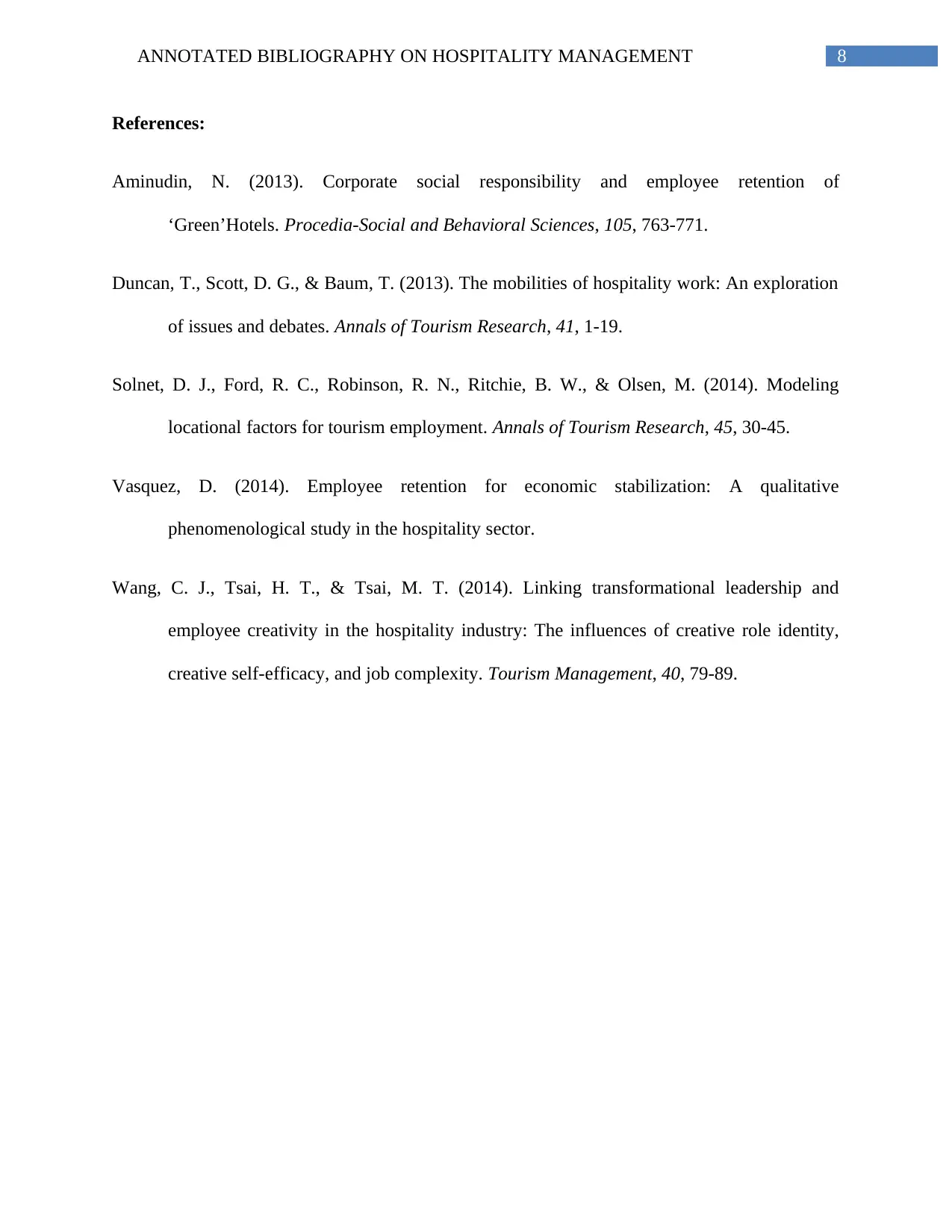
8ANNOTATED BIBLIOGRAPHY ON HOSPITALITY MANAGEMENT
References:
Aminudin, N. (2013). Corporate social responsibility and employee retention of
‘Green’Hotels. Procedia-Social and Behavioral Sciences, 105, 763-771.
Duncan, T., Scott, D. G., & Baum, T. (2013). The mobilities of hospitality work: An exploration
of issues and debates. Annals of Tourism Research, 41, 1-19.
Solnet, D. J., Ford, R. C., Robinson, R. N., Ritchie, B. W., & Olsen, M. (2014). Modeling
locational factors for tourism employment. Annals of Tourism Research, 45, 30-45.
Vasquez, D. (2014). Employee retention for economic stabilization: A qualitative
phenomenological study in the hospitality sector.
Wang, C. J., Tsai, H. T., & Tsai, M. T. (2014). Linking transformational leadership and
employee creativity in the hospitality industry: The influences of creative role identity,
creative self-efficacy, and job complexity. Tourism Management, 40, 79-89.
References:
Aminudin, N. (2013). Corporate social responsibility and employee retention of
‘Green’Hotels. Procedia-Social and Behavioral Sciences, 105, 763-771.
Duncan, T., Scott, D. G., & Baum, T. (2013). The mobilities of hospitality work: An exploration
of issues and debates. Annals of Tourism Research, 41, 1-19.
Solnet, D. J., Ford, R. C., Robinson, R. N., Ritchie, B. W., & Olsen, M. (2014). Modeling
locational factors for tourism employment. Annals of Tourism Research, 45, 30-45.
Vasquez, D. (2014). Employee retention for economic stabilization: A qualitative
phenomenological study in the hospitality sector.
Wang, C. J., Tsai, H. T., & Tsai, M. T. (2014). Linking transformational leadership and
employee creativity in the hospitality industry: The influences of creative role identity,
creative self-efficacy, and job complexity. Tourism Management, 40, 79-89.
⊘ This is a preview!⊘
Do you want full access?
Subscribe today to unlock all pages.

Trusted by 1+ million students worldwide
1 out of 9
Related Documents
Your All-in-One AI-Powered Toolkit for Academic Success.
+13062052269
info@desklib.com
Available 24*7 on WhatsApp / Email
![[object Object]](/_next/static/media/star-bottom.7253800d.svg)
Unlock your academic potential
Copyright © 2020–2026 A2Z Services. All Rights Reserved. Developed and managed by ZUCOL.





